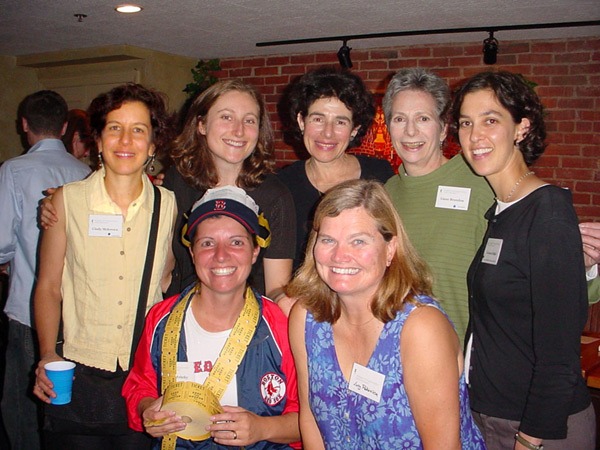
Company/Organization Profiles | Local Industry
Talk to Me: The Media Mentors Program
Written by Ellen Mills | Posted by: Anonymous
Good advice is welcome at any age, but in terms of one’s career the right advice at the right time can determine success. The "Media Mentors" program run by Women in Film and Video/New England (WIFV/NE) links media professionals with a more experienced person in their field who can give them specific information and advice. Irena Fayngold, a member of WIFV/NE, founded the program with Jessica Gidal last year. "I was asked to be on the board (of WIFV/NE) but I wasn’t able to make that time commitment, so I started thinking about what else I could do.
"When I was first starting out I worked on a pro-bono video for WIFV/NE which was co-produced by Angelica Brisk and Michelle Nicholasen for the Big Sister Association," Fayngold says. "I met so many fabulous women in the industry and learned so much by editing and working with Angelica and Michelle that this inspired me to find a way to give back to the organization."
Fayngold was looking for someone to help her with the formation of the program when she met fellow WIFV/NE member and current board member, Jessica Gidal, also an editor and associate producer. "I could see the need for a program like this and I thought it was a great project to get involved in," Gidal says. At the time Gidal was new to the Boston community and it also served as a way to meet other people in the local media industry.
Fayngold, an editor and associate producer, was working at WGBH-TV in Boston at the time and by coincidence they were starting their own internal mentorship program. She applied and became a mentee. She also spoke to the administrator of the WGBH program, Angela Lifsey, for guidance on creating such a program. Fayngold says that Lifsey was generous with her time and helped her and Gidal address some fundamental questions.
"She really helped us think through the development process," Fayngold says. "She told us what it’s like to recruit mentors and think about what’s enough for the mentee and not too much for the mentor, especially when you have no funding."
One of the facts that became clear early on for the organizers was that there needed to be clear boundaries for both participants. Fayngold and Gidal determined that mentors and mentees should have two face-to-face meetings and four phone conversations over the course of a four-month period. Fayngold says, "There’s a general belief that in a mentorship you can build skills, but that’s not true. There’s not enough time and contact to have this happen. What mentees do get is: insight, information and advice."
Both women acknowledge that mentoring on an informal basis occurs all the time between experienced filmmakers and aspiring ones. "Several of the mentors told us ‘I basically do this all the time’ but without the comfort of guidelines," says Gidal. For the mentees, she says, "It’s really hard to call someone. You can cold-call people, but you won’t necessarily get their attention. Having some kind of established contact in advanced facilitates the connection."
The application for the mentees asks them to describe their goals for participating in the program. Gidal says, "It works best when someone has a specific goal." Fayngold agrees, saying, "It must be a goal that’s achievable through talking with a mentor." Mentors also need to understand that they will not be exchanging their time for work by the mentee. After the mentees are accepted and matched with a mentor, Fayngold and Gidal run a workshop of what to expect and how best to use the time with a mentor.
For the start of the program, the organizers solicited the membership of WIFV/NE for mentors. "A couple applied and they were great," Fayngold says. Gidal says they also asked the board for recommendations because "there are names of people that everyone knows." In the end, they were able to match ten pairs of mentors and mentees.
One of the mentors who volunteered early in the process was Rena Baskin, an actor and narrator based in Boston. Baskin has been a member of WIFV/NE for many years although she notes that actors don’t comprise a large part of the membership. "I’ve been on the board a couple of times," she says "The reason I joined was I wanted to help support women and women’s view of the world in the media." As for mentoring, she says, "I’ve done that anyway. I’m pretty willing to help people if they ask me."
Baskin was matched with Lucy Robinson, an actor from Western Massachusetts.
Baskin says they met for coffee and conversation and enjoyed a nice rapport. The two women found they shared the experience of changing careers into the media/entertainment field. Baskin’s original career was in psychology. "I realized that I couldn’t counsel other people to follow their heart and not do it myself," she says. "It’s great to see a woman in mid-life starting a new career. I’m thrilled that she’s pursuing this." Baskin encouraged Robinson but also provided concrete help. "I gave her a lot of names of people to contact and how to contact them," she says. "I answered some questions for her like: ‘what are the tools of the trade? How do you promote yourself? Union or non-union? These are things I could help her with."
From her point of view, Robinson says, "It was so terrific to hook up with a real pro in the business of acting. I could ask her all the questions I’ve had about getting more than just a toe-hold in the industry… Rena was very welcoming and immense help."
Baskin adds that one of the advantages for her of being a mentor was that, "It reviewed in my mind what I should be doing for my own career."
All of the participants in last year’s program were women, although Media Mentors accepts applications from both men and women. Membership in WIFV/NE is open to men also. Fayngold says that some fields within filmmaking such as camerawork still have a larger percentage of men than women, but she feels that a mentor is equally beneficial to both genders. Gidal feels that, "In general, a lot of women tend to undervalue themselves and with fewer women in the industry, that can become ingrained." She believes that having a female mentor "can be inspirational to women."
According to Fayngold the majority of the matches were successful and both parties were pleased with the results. There were a few which were not as fulfilling. "In one match the mentee decided that it wasn’t the resource she needed," Fayngold explains. "One mentor said she was confused about the mentee’s direction." Of course, there can be an uncertain element in any kind of human matchmaking. "Sometimes people just don’t hit it off," Fayngold says.
Gidal says that "on the drawing board" for this year is arranging a meeting or two of all the mentees during the program to allow them to share their experiences with each other. Fayngold would also, "love to have funding so we could give stipends to mentors."
Fayngold says they expect to make the same number of matches for this year’s program and possibly more, depending on the number of applications. She says the initial work to get the program going was time-consuming. "Jessica and I met every two weeks for a year. I could never have done it alone," Fayngold says. "Working together was so much more fun and productive." She sees that spirit of collaboration as one of the goals of the program as well; "We need each other as a community to accomplish what we do," she says.
For information and applications for the Media Mentors program visit www.womeninfilmvideo.org or call (617) 612-0091. For questions about the program: wifvnementors@hotmail.com. Applications for this year are due Oct. 29th.










